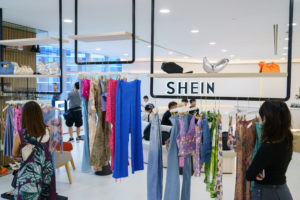
Shein’s Unfashionable IP And RICO Controversies

(Photo by Bloomberg/Getty Images)
Shein’s various controversies are gaining attention in the media in light of its highly anticipated initial public offering (IPO). Shein’s alleged copyright and trademark infringement has given rise to over 50 federal lawsuits in the U.S., including a lawsuit involving Racketeer Influenced and Corrupt Organizations (RICO) claims stemming from Shein’s alleged infringement. Shein is also under investigation for its alleged human rights violations through use of forced labor, along with concerns related to environmental and health risks. I will discuss these pressing issues in greater detail below.
googletag.cmd.push( function() { // Display ad. googletag.display( "div-id-for-top-300x250" ); });For some background, Shein is a Chinese-based fast fashion brand that sells trendy clothing globally, often priced as low as $1-5. Their production is so fast, in fact, that they offer thousands of new items on their website every day. The popularity of the Shein app has further boosted their rapid growth, with its Gen Z consumer base now browsing Shein as a part of their daily routine. Although going viral for its insensitive sales of a swastika necklace and Muslim prayer mats marketed as “decorative and floral tassel trim mats,” Shein was still able to raise capital this April at a valuation of $100 billion.
 Sponsored InterAction+ Brings Power Of CRM Software To Law Firms Of All Sizes The only legal CRM with exclusive content from LexisNexis®. From LexisNexis® InterAction+™
Sponsored InterAction+ Brings Power Of CRM Software To Law Firms Of All Sizes The only legal CRM with exclusive content from LexisNexis®. From LexisNexis® InterAction+™ In addition to the numerous infringement lawsuits filed against Shein from brands like Oakley, Dr. Martens, Ralph Lauren, and Stussy, Chrome Hearts filed a complaint against Shein’s subsidiaries (Zoetop Business and Shein US Services) in the Central District of California on August 24. The complaint alleges trademark infringement, false designation of origin, and unfair competition arising from Shein’s “marketing, distribution, advertisement, offering for sale, and/or sale of handbags and accessories that bear marks that are identical with, substantially indistinguishable from, or confusingly similar to one or more of the Chrome Hearts Marks.”
Unlike Shein, Chrome Hearts is an American luxury brand. Chrome Hearts asserts that it has been designing, manufacturing, and selling leather goods, apparel, jewelry, and accessories since 1988 and that “[v]irtually all Chrome Hearts products, including clothing, denim, and jewelry, are handmade in Los Angeles by Chrome Hearts’ craftsmen.” The brand also asserts that it owns “various design only marks, and composite trademarks comprising the CHROME HEARTS mark and design components.” The design marks upon which Shein allegedly infringed include a “Cemetery Cross Patch,” a “CH Plus,” a “CH Cross,” and a “Dagger Design.” Chrome Hearts argues that as a result of its long use, extensive sales, and annual advertising expenses surpassing $1 million, its marks have widespread acceptance and recognition amongst the public. In addition to monetary damages, Chrome Hearts asks for injunctive relief as well as an order directing defendants to recall all accused products from any distributors and retailers, delivering them to Chrome Hearts for destruction.
googletag.cmd.push( function() { // Display ad. googletag.display( "div-id-for-middle-300x250" ); }); googletag.cmd.push( function() { // Display ad. googletag.display( "div-id-for-storycontent-440x100" ); }); googletag.cmd.push( function() { // Display ad. googletag.display( "div-id-for-in-story-youtube-1x1" ); });This is not Chrome Hearts’ initial foray into trademark infringement litigation. Similar to numerous prior cases against Shein, several of Chrome Hearts’ previous legal actions have been resolved through voluntary dismissals following settlements between the involved parties.
Shein might adopt a legal stance akin to a previous defendant, MNML, in the Chrome Hearts lawsuit, contending that Chrome Hearts’ trademark is “invalid and unenforceable.” This argument would be based on the assertion that Chrome Hearts obtained its trademark registration with the intention to mislead the USPTO, highlighting that its application showcased “hangtags” rather than the ornamental designs on jeans as claimed in the complaint. Additionally, Shein could argue that it employs the disputed marks in an ornamental manner rather than as a source identifier. It’s important to note that the purely ornamental or decorative use of a design mark typically does not amount to infringement. Nevertheless, a settlement akin to previous cases involving Chrome Hearts appears probable.
Sponsored Sponsored Pickleball, Pancakes, and PhDs – Balancing Law And Life Think you need to sacrifice one thing for the other? Think again. From Peerpoint
Sponsored Pickleball, Pancakes, and PhDs – Balancing Law And Life Think you need to sacrifice one thing for the other? Think again. From Peerpoint  Sponsored Lex Machina's Karl Harris On Success With AI Lex Machina CEO Karl Harris weighs in on the future of generative AI in legal tech, and what best positions a company for success. From Ethan Beberness
Sponsored Lex Machina's Karl Harris On Success With AI Lex Machina CEO Karl Harris weighs in on the future of generative AI in legal tech, and what best positions a company for success. From Ethan Beberness  Sponsored Experience AI-Powered Contract Negotiation With Ontra Tired of negotiating and managing routine contracts? Ontra makes the most of human expertise and proprietary AI assistance to automate contracts like never before. From Ethan Beberness
Sponsored Experience AI-Powered Contract Negotiation With Ontra Tired of negotiating and managing routine contracts? Ontra makes the most of human expertise and proprietary AI assistance to automate contracts like never before. From Ethan Beberness  Sponsored Lex Machina's Karl Harris On Success With AI Lex Machina CEO Karl Harris weighs in on the future of generative AI in legal tech, and what best positions a company for success. From Ethan Beberness
Sponsored Lex Machina's Karl Harris On Success With AI Lex Machina CEO Karl Harris weighs in on the future of generative AI in legal tech, and what best positions a company for success. From Ethan Beberness Another recent legal proceeding brought against Shein involves a RICO claim. Filed this July by three independent designers, the RICO claim alleges that Shein produced, distributed, and sold exact copies of the plaintiffs’ creative work. Among other infringing activities, plaintiffs allege that Shein sold a mechanical copy of plaintiff Perry’s “Make It Fun” artwork, as well as a mechanical copy of Perry’s “Floral Bloom” design on an identical throw blanket as the one Perry sells.
The plaintiffs assert that a civil RICO claim was designed to “address the misconduct of culpable individual cogs in a larger enterprise.” Anyone can bring a civil RICO claim, and if they win, receive treble damages. A civil RICO claim requires that the defendant engaged in a pattern of committing one of the numerated RICO crimes. Pursuant to a 2005 act of Congress adding “criminal infringement of a copyright” to the definition of “racketeering activity,” the plaintiffs assert that Shein’s “egregious copyright infringement” constitutes racketeering.
Where alleged “systematic criminal intellectual property infringement is baked in from the very beginning,” the plaintiffs argue that “Shein’s policy [is] to knowingly accept, tolerate and even encourage and facilitate such misappropriation.” While the plaintiffs acknowledge that “[w]ithout investigation, it’s impossible to say how the Shein algorithm produces its results,” the plaintiffs claim that “Shein’s design ‘algorithm’ could not work without generating the kinds of exact copies that can greatly damage an independent designer’s career.” The plaintiffs go as far to allege that “Shein employs the sweatshop and creativity-free version of such a design process” failing to utilize the talent of a real designer.
googletag.cmd.push( function() { // Display ad. googletag.display( "div-id-for-bottom-300x250" ); });The plaintiffs state that Shein’s method of production is designed to facilitate creation of infringing products. Their description of Shein’s “testing-the-waters” production approach is as follows: The initial production run for each new product sold on Shein’s website is as low as 100-200 units per SKU. Shein offers these products for sale online and monitors for any complaints regarding infringement. In most cases, where a Shein product infringes upon the work of a small designer, the infringement will go unnoticed and if demand is high, the item is reordered. However, in the unlikely circumstance where a small designer notices infringement, Shein tends to shift blame onto an unnamed third party for the misconduct, claim sales were low, and offer a very modest settlement. Conversely, if a prominent company like Nike identifies infringement, Shein promptly receives notification and complies with a “cease and desist” directive.
The plaintiffs also contend that despite Shein presenting itself as an integrated company, Shein’s decentralized structure is intentionally designed to avoid liability. Specifically, the plaintiffs allege that the “Shein Enterprise uses its byzantine structure to [its] advantage . . . by making it impossible for intellectual property plaintiffs to figure out who to sue.” The plaintiffs continue to assert that among the numerous cases filed against Shein, there is no clear consensus about whom to sue. For instance, they claim that many plaintiffs file lawsuits against Zoetop Business Co, a Hong Kong limited company, as well as Shein Distribution Corporation (SDC), a Delaware-based company. Furthermore, the plaintiffs allege that while Zoetop holds a significant position in the organizational hierarchy, it has contested personal jurisdiction. Conversely, while SDC falls under the court’s jurisdiction, Shein has explicitly stated that for plaintiffs suing SDC, foreign profits are not within reach and will not be disclosed.
Sponsored Sponsored Announcing Ontra Atlas, Modern Entity Management Built for Private Equity Ontra Atlas extends Ontra’s Legal Operating System, an AI-enabled platform that digitally transforms critical legal workflows. From Ontra
Sponsored Announcing Ontra Atlas, Modern Entity Management Built for Private Equity Ontra Atlas extends Ontra’s Legal Operating System, an AI-enabled platform that digitally transforms critical legal workflows. From Ontra  Sponsored InterAction+ Brings Power Of CRM Software To Law Firms Of All Sizes The only legal CRM with exclusive content from LexisNexis®. From LexisNexis® InterAction+™
Sponsored InterAction+ Brings Power Of CRM Software To Law Firms Of All Sizes The only legal CRM with exclusive content from LexisNexis®. From LexisNexis® InterAction+™ Nevertheless, the plaintiffs assert that the numerous Shein entities are interconnected and their joint activities “consists of multiple acts of racketeering and criminal copyright infringement by the defendants, [which] is interrelated, not isolated, and is perpetrated for the same or similar purposes by the same persons, including Mr. Xu and the Shein leadership.”
The same leaders perpetrating the alleged RICO claims have also garnered attention for their failure to respond to demands from 16 state attorneys general to answer questions about its business practices, as the company contemplates an IPO. The attorneys general voiced their concerns in a letter dated August 24 to the chair of the Securities and Exchange Commission, Gary Gensler.
In this letter, the attorneys general accuse Shein of exploiting forced labor and violating the Uyghur Forced Labor Prevention Act (UFLPA), Public Law No. 117-78. The letter notes that an independent test conducted by Bloomberg News last year “found significant evidence that cotton produced in the Xinjiang Autonomous Region was present in clothing sold by Shein.” The U.S. enacted a ban on imports from the Xinjiang region of China because of its widespread human rights abuses against the Uyghur minority. The UFLPA creates a rebuttable presumption that “goods mined, produced, or manufactured wholly or in part in Xinjiang or by an entity on the UFLPA Entity List are prohibited from U.S. importation.” While Shein denies these allegations, citing its own tests, the attorneys general claim that “Shein has a documented history of lying about its labor practices,” and that “[s]uch self-certification is insufficient.”
The letter was also concerned that Shein “utilizes Section 321 of the Tariff Act of 1930, known as the ‘de minimis exception’ which allows importers to avoid customs duties on incoming packages that are valued at less than $800.”
The letter urges the SEC to mandate “as a condition of being listed on a U.S. based securities exchange, that any foreign-owned company certify via a truly independent process that it is compliant with Section 307 of the Tariff Act of 1930, which prohibits the import of any product manufactured wholly or in part by forced labor.”
The U.S. isn’t the only country that is wary of Shein’s business practices. Last year Greenpeace Germany published a report that found 32% of the 47 Shein products it tested contained significant levels of hazardous chemicals such as PFAs, phthalates and lead. Seven of these items even contained chemical levels that break EU regulatory limits.
As Shein navigates its path towards an IPO and expands its global influence, it must actively address these pressing issues to foster trust, ensure legal compliance, and sustain a reputation aligned with ethical and responsible business practices. The outcome of these challenges will undoubtedly impact Shein’s trajectory and perception in the global fashion industry.
Nicolette Shamsian joined Above the Law as a fashion law columnist in 2023. Nicolette earned her B.A., summa cum laude, in Political Science and minor in Entrepreneurship from the University of California, Los Angeles and her Juris Doctor from UCLA School of Law. Nicolette is an attorney whose work focuses on intellectual property litigation. As a fashion law aficionado, Nicolette enjoys leading discussions to keep attorneys up to date on noteworthy fashion law cases.
TopicsATL Fashion, Fashion, Intellectual Property, Nicolette Shamsian, SHEIN
Introducing Jobbguru: Your Gateway to Career Success
The ultimate job platform is designed to connect job seekers with their dream career opportunities. Whether you're a recent graduate, a seasoned professional, or someone seeking a career change, Jobbguru provides you with the tools and resources to navigate the job market with ease.
Take the next step in your career with Jobbguru:
Don't let the perfect job opportunity pass you by. Join Jobbguru today and unlock a world of career possibilities. Start your journey towards professional success and discover your dream job with Jobbguru.
Originally posted on: https://abovethelaw.com/2023/09/sheins-unfashionable-ip-and-rico-controversies/